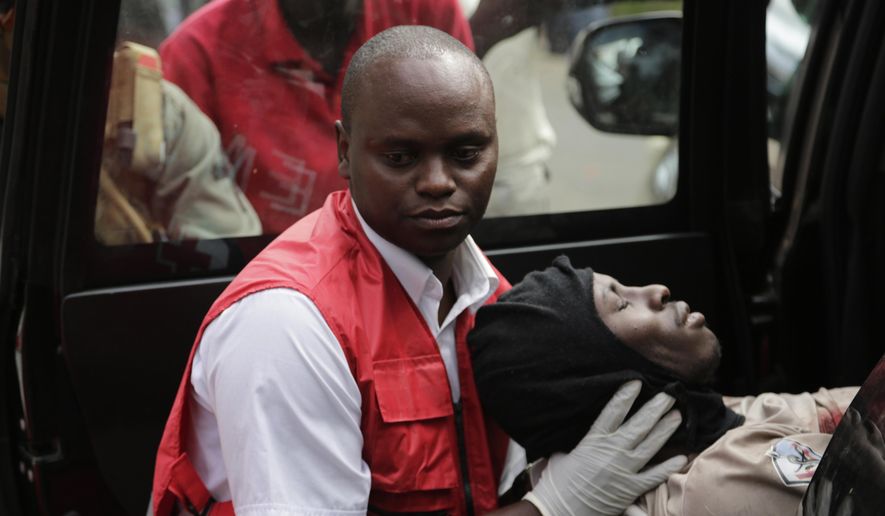NAIROBI, Kenya — Grief turned to anger as Kenyans visited the Chiromo Mortuary to discover whether loved ones had been killed in the latest terrorist attack to devastate a supposedly secure part of the capital.
“When will these terror attacks stop?” asked Margret Mwende, a small-shop owner who was looking for her niece at the mortuary. “We have lost many of our relatives as a result of these attacks. We demand government’s action, not just words and promises. How did they allow terrorists to cross our borders?”
The Tuesday attack on the DusitD2 compound of luxury shops and hotels in the capital killed at least 21 people, including one American and a British national, the government said. National police chief Joseph Boinnet told reporters late Wednesday that a police officer had died as a result of injuries he sustained while trying to end the assault.
Sixteen Kenyans and three other Africans whose nationalities had not been identified were counted among the dead, including the five gunmen. Another 28 were wounded.
Five men armed with guns and explosives attacked the compound at night and held about 176 hostages until security services intervened.
The militant Somali Islamist group al-Shabab, with links to al Qaeda, claimed responsibility for the attack, the SITE Intelligence Group reported.
Terrorist attacks are far from uncommon in Africa and in major Western capitals, but there is widespread sentiment that Kenya has become a particularly frequent target and that the attacks are unusually brutal and deadly.
The Tuesday assault was reminiscent of al-Shabab’s attack two miles away on the Westgate Shopping Mall in 2013. The militants killed 67 people during a siege that lasted more than three days before officials reasserted control. Al-Shabab also claimed responsibility for a gruesome attack on Kenya’s Garissa University College in 2015, killing 148 people including a large number of students.
Analysts praised Kenya’s security agencies for absorbing lessons from the Westgate mall attack and organizing a prompt response that ended the Dusit crisis, which could have ended in a much worse massacre.
“There was quick response and coordinated efforts by security agencies to arrest the situation,” said Francis Maina, a former colonel in the Kenyan army who is now a security analyst.
Security camera footage showed the apparent suicide bomber detonating his explosives near the complex. The flash is visible, along with smoke billowing from the spot where he had been standing.
But Mr. Maina faulted the government’s larger strategy for confronting the terrorist threat after Kenyan soldiers entered Somalia in 2011 in a bid to stabilize the country’s war-torn neighbor. Kenyan leaders also have failed to implement existing security laws that might help counterterrorism efforts, he said.
The 2011 Somalia incursion, critics say, put a bull’s-eye on Kenya that security officials have been slow to appreciate. Al-Shabab leaders have repeatedly vowed to punish Nairobi for intervening in the civil war.
“The government needs a more unified homeland security structure to ensure efficiency when it comes to sharing of intelligence among all security agencies,” said Mr. Maina. “This will allow security agencies to respond immediately in case of attacks.”
American identified
San Francisco-based company I-DEV International confirmed to The Associated Press on Wednesday that American Jason Spindler, a onetime Peace Corps volunteer, was among those killed Tuesday. Mr. Spindler, 41, was the co-founder and managing director of I-DEV, which worked with international companies to form business partnerships in Kenya.
The company said in an email that nine other workers in its Nairobi office were evacuated safely, the AP reported.
Michael Ouma, 28, a taxi driver who left the hotel minutes before the attack, wondered how terrorists managed to enter the luxury complex without attracting notice. The hotel is about 2 miles from the Westgate mall, he noted.
“I really thank God for saving me,” said Mr. Ouma. “It wasn’t my day to die. I heard that the client I dropped was shot dead as he made his way to the hotel. It was shocking and traumatizing. Our government needs to do something.”
In his address from the State House on Wednesday, President Uhuru Kenyatta vowed again to crack down on terrorism. In a country whose economy relies heavily on foreign tourism, he assured all Kenyans and visitors of their safety in the country. He said multiple security efforts are underway to defeat al-Shabab and other terrorist groups.
“We’ll seek out all those involved in planning, functioning and execution of the act,” said Mr. Kenyatta. “But my heart goes out to innocent men and women violated by the senseless violence.”
Opposition leader Raila Odinga, a longtime rival of Mr. Kenyatta, also warned that “divisions are what terrorists thrive on” and that national unity was vital in the face of the latest attack.
He said Wednesday that the Islamic extremist gunmen did not care about the ethnic, religious or political affiliations of their victims.
“Their mission was to cause pain and fear, and they proceeded to do so without seeking details,” Mr. Odinga said.
The grief the families displayed at the mortuary showed the long journey to healing in a shellshocked population.
The Kenyan Red Cross said about 50 people were unaccounted for, but many of those were believed not to have been in the complex during the attack.
Ken Njoroge, CEO of a company in the DusitD2 complex that offers mobile banking services, said he was still unable to locate several employees Wednesday evening.
“It’s very difficult for the families because the passage of time only makes the problem bigger,” he told reporters.
At the morgue, one unidentified woman broke down in tears after authorities informed her that her loved one was dead.
“Why? Why? Why? Why?” she shouted as family brought her into the building. “You didn’t deserve to die like this, and it hurts me. God help me.”
⦁ This article is based in part on wire service reports.




Please read our comment policy before commenting.